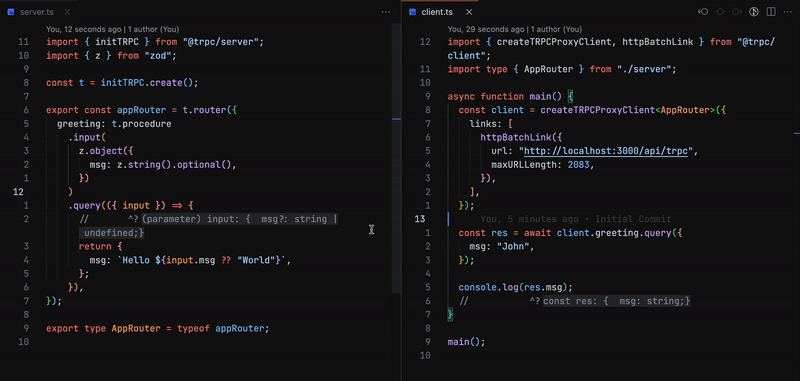
Security News
Research
Data Theft Repackaged: A Case Study in Malicious Wrapper Packages on npm
The Socket Research Team breaks down a malicious wrapper package that uses obfuscation to harvest credentials and exfiltrate sensitive data.
@trpc/client
Advanced tools
@trpc/client is a TypeScript-first framework for building end-to-end typesafe APIs. It allows you to create and consume APIs with full type safety, ensuring that your client and server are always in sync.
Creating a TRPC Client
This code demonstrates how to create a TRPC client that connects to a TRPC server running at 'http://localhost:4000/trpc'.
const trpc = require('@trpc/client');
const { createTRPCClient } = trpc;
const client = createTRPCClient({
url: 'http://localhost:4000/trpc',
});Making a Query
This code demonstrates how to make a query to the TRPC server to fetch a user with a specific ID.
const result = await client.query('getUser', { id: 1 });
console.log(result);Making a Mutation
This code demonstrates how to make a mutation to the TRPC server to create a new user.
const newUser = await client.mutation('createUser', { name: 'John Doe' });
console.log(newUser);Subscribing to a Subscription
This code demonstrates how to subscribe to a subscription on the TRPC server to listen for updates to a specific user.
const subscription = client.subscription('onUserUpdate', { userId: 1 }, {
onData: (data) => console.log('User updated:', data),
onError: (err) => console.error('Subscription error:', err),
});Apollo Client is a comprehensive state management library for JavaScript that enables you to manage both local and remote data with GraphQL. Unlike @trpc/client, which is TypeScript-first and focuses on end-to-end type safety, Apollo Client is centered around GraphQL and offers a rich ecosystem for managing data fetching, caching, and state management.
Axios is a promise-based HTTP client for the browser and Node.js. While it does not offer the same level of type safety and end-to-end integration as @trpc/client, it is a versatile and widely-used library for making HTTP requests.
React Query is a data-fetching library for React applications that simplifies fetching, caching, and synchronizing server data. It can be used with any data-fetching library, including @trpc/client, to manage server state in a React application. Unlike @trpc/client, React Query is not focused on type safety but rather on providing a powerful and flexible data-fetching solution.
End-to-end typesafe APIs made easy

@trpc/clientCommunicate with a tRPC server on the client side.
Full documentation for @trpc/client can be found here
# npm
npm install @trpc/client@next
# Yarn
yarn add @trpc/client@next
# pnpm
pnpm add @trpc/client@next
# Bun
bun add @trpc/client@next
import { createTRPCClient, httpBatchLink } from '@trpc/client';
// Importing the router type from the server file
import type { AppRouter } from './server';
// Initializing the tRPC client
const trpc = createTRPCClient<AppRouter>({
links: [
httpBatchLink({
url: 'http://localhost:3000/trpc',
}),
],
});
async function main() {
// Querying the greeting
const helloResponse = await trpc.greeting.query({
name: 'world',
});
console.log('helloResponse', helloResponse); // Hello world
}
main();
FAQs
The tRPC client library
The npm package @trpc/client receives a total of 458,936 weekly downloads. As such, @trpc/client popularity was classified as popular.
We found that @trpc/client demonstrated a healthy version release cadence and project activity because the last version was released less than a year ago. It has 3 open source maintainers collaborating on the project.
Did you know?

Socket for GitHub automatically highlights issues in each pull request and monitors the health of all your open source dependencies. Discover the contents of your packages and block harmful activity before you install or update your dependencies.

Security News
Research
The Socket Research Team breaks down a malicious wrapper package that uses obfuscation to harvest credentials and exfiltrate sensitive data.

Research
Security News
Attackers used a malicious npm package typosquatting a popular ESLint plugin to steal sensitive data, execute commands, and exploit developer systems.

Security News
The Ultralytics' PyPI Package was compromised four times in one weekend through GitHub Actions cache poisoning and failure to rotate previously compromised API tokens.